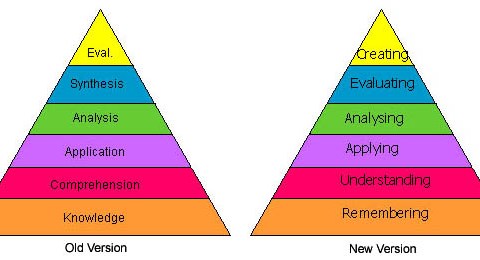Do students need to learn lower-level factual and procedural knowledge before they can do higher-order thinking?

There is a prevailing conception that students must learn facts and procedural knowledge BEFORE they can then engage in so-called ‘higher-order’ thinking skills. Educators, parents, policymakers, online commentators, and others point to Bloom’s taxonomy (which typically has been portrayed as a pyramid) and say, “See? You have to do this stuff down here before you can do that stuff up top!”
But that’s not how Bloom and his co-authors categorized the taxonomy:
Bloom et al. discussed at length their decision to apply an Aristotelian categorization method in their taxonomy. The choice was significant, because an Aristotelian method creates distinct, bounded categories ordered by complexity without the hierarchical assumption that higher-level categories always entail instantiation of those lower in the taxonomy (e.g., when evaluating, it is not always necessary to first apply and synthesize). Moreover, Aristotelian categorization emphasizes that these groupings are closely related and difficult to tease apart. . . . however, the division of the taxonomy of educational objectives into classes representing lower order … and higher order thinking … has prevailed in research.
Alexander, P.A., et al. (2011). Higher-order thinking and knowledge: Domain-general and domain-specific trends and future directions. In G. Schraw & D. R. Robinson (Eds.), Assessment of higher order thinking skills (pp. 49-50). Charlotte, NC: Information Age Publishing.
Similarly, as the National Research Council stated a quarter-century ago:
the term ‘higher order’ skills is probably itself fundamentally misleading, for it suggests that another set of skills, presumably called ‘lower order,’ needs to come first. This assumption – that there is a sequence from lower level activities that do not require much independent thinking or judgment to higher level ones that do – colors much educational theory and practice. Implicitly, at least, it justifies long years of drill on the ‘basics’ before thinking and problem solving are demanded. Cognitive research on the nature of basic skills such as reading and mathematics provides a fundamental challenge to this assumption.
National Research Council. (1987). Education and learning to think (p. 8). Washington, DC: National Academy Press.
Expert thinking does indeed require a high degree of domain knowledge. Hopefully no one is arguing that kids can be high-level thinkers ‘without knowing anything.’ But the notion that students have to be immersed in ‘lower-level’ factual and procedural knowledge BEFORE they can do ‘higher-level’ thinking work doesn’t comport with what we know from cognitive research.
So what?
The problem with taking a sequential approach to Bloom’s taxonomy is that many students – especially those from traditionally-underserved populations – rarely, if ever, get to engage in the ‘higher-level’ thinking work that is critically necessary these days. Instead, they remain mired in the ‘lower-level’ thinking domains, doomed to a steady diet of decontextualized fact nuggets and procedural regurgitation. What is advocated as a foundational floor instead becomes a rigid ceiling in practice, thus negatively impacting student engagement and interest, knowledge retention and procedural mastery, dropout and graduation rates, workforce preparation needs, and so on.
We can do better. In fact, we already are doing better in certain places. We just need to take more cues from schools like those in the New Tech, Big Picture Learning, Envision, Expeditionary Learning, Independent Curriculum Group, High Tech High, and EdVisions networks. These schools do a much better job than most traditional schools of emphasizing ‘higher-level’ thinking work for students while simultaneously ensuring that ‘kids know stuff.’ In fact, we’re finding that students in these schools typically are more successful and care more about what they’re learning because whatever facts and procedures they need to know are embedded within the context of doing more relevant, meaningful, and authentic work. That sounds pretty good to me! Now, if my local school district would just get on board…
Your thoughts and experiences?
Image credit:Bloom’s taxonomy





